
Carmilla is an 1872 Gothic novella by Irish author Sheridan Le Fanu and one of the early works of vampire fiction, predating Bram Stoker's Dracula (1897) by 25 years. First published as a serial in The Dark Blue (1871–72), the story is narrated by a young woman preyed upon by a female vampire named Carmilla, later revealed to be Mircalla, Countess Karnstein. The character is a prototypical example of the lesbian vampire, expressing romantic desires toward the protagonist. The story is often anthologised, and has been adapted many times in film and other media.
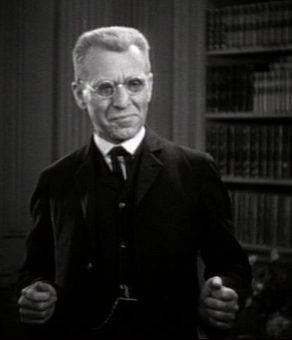
Professor Abraham Van Helsing is a fictional character from the 1897 gothic horror novel Dracula written by Bram Stoker. Van Helsing is a Dutch polymath doctor with a wide range of interests and accomplishments, partly attested by the string of letters that follows his name: "MD, D.Ph., D.Litt., etc.", indicating a wealth of experience, education and expertise. He is a doctor, professor, lawyer, philosopher, scientist, and metaphysician. The character is best known through many adaptations of the story as a vampire slayer, monster hunter and the arch-nemesis of Count Dracula, and the prototypical and the archetypical parapsychologist in subsequent works of paranormal fiction. Some later works tell new stories about Van Helsing, while others, such as Dracula (2020) and I Woke Up a Vampire (2023) have characters that are his descendants.
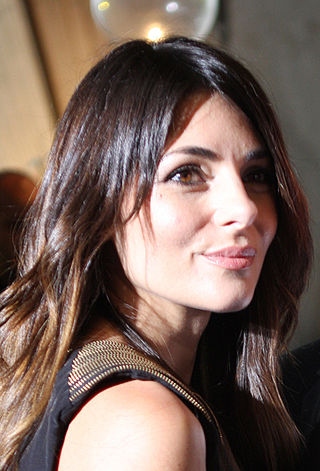
Silvia Colloca is an Italian-Australian actress, opera singer, cookbook author, and television cookery show personality. She has published six cookbooks.

Vampire Hunter D: Bloodlust is a 2000 dark fantasy vampire adventure anime film produced by Madhouse, Filmlink International, BMG Japan, Movic, Good Hill Vision, and Soft Capital. It was written, directed and storyboarded by Yoshiaki Kawajiri, with Yutaka Minowa designing the characters, Yūji Ikehata serving as art director and designing the setting, and Marco D'Ambrosio composing the music. The film is based on the third novel of Hideyuki Kikuchi's Vampire Hunter D series, Demon Deathchase.

Wilhelmina "Mina" Harker is a fictional character and the main female character in Bram Stoker's 1897 Gothic horror novel Dracula.

Vampire films have been a staple in world cinema since the era of silent films, so much so that the depiction of vampires in popular culture is strongly based upon their depiction in films throughout the years. The most popular cinematic adaptation of vampire fiction has been from Bram Stoker's 1897 novel Dracula, with over 170 versions to date. Running a distant second are adaptations of the 1872 novel Carmilla by Sheridan Le Fanu. By 2005, the Dracula character had been the subject of more films than any other fictional character except Sherlock Holmes.
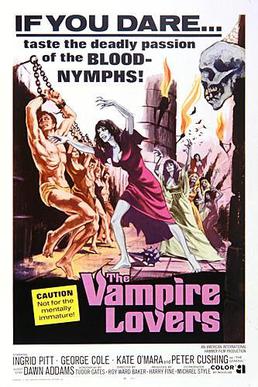
The Vampire Lovers is a 1970 British Gothic horror film directed by Roy Ward Baker and starring Ingrid Pitt, Peter Cushing, George Cole, Kate O'Mara, Madeline Smith, Dawn Addams, Douglas Wilmer and Jon Finch. It was produced by Hammer Film Productions. It is based on the 1872 Sheridan Le Fanu novella Carmilla and is the first film in the Karnstein Trilogy, the other two films being Lust for a Vampire (1971) and Twins of Evil (1971). The three films were somewhat daring for the time in explicitly depicting lesbian themes.

Lesbian vampirism is a trope in early gothic horror and 20th century exploitation film. The archetype of a lesbian vampire used the fantasy genre to circumvent the heavy censorship of lesbian characters in the realm of social realism.

Taste the Blood of Dracula is a 1970 British supernatural horror film produced by Hammer Film Productions. Directed by Peter Sasdy from a script by Anthony Hinds, it is the fifth installment in Hammer's Dracula series, and the fourth to star Christopher Lee as Count Dracula, the titular vampire. The film also features Geoffrey Keen and Gwen Watford.
The Karnstein Trilogy is a series of vampire films produced by Hammer Films. They were notable at the time for their daring lesbian storylines. All three films were scripted by Tudor Gates. All three feature vampires of the noble Karnstein family, and their seat Castle Karnstein near the town of Karnstein in Styria, Austria.
Mathew Frazer Horne is an English actor, comedian, singer, television presenter and narrator. He is best known for appearing on several BBC sketch shows and sitcoms, most notably Gavin & Stacey, The Catherine Tate Show, Horne & Corden, and Bad Education.

LGBT themes in horror fiction refers to sexuality in horror fiction that can often focus on LGBTQ+ characters and themes within various forms of media. It may deal with characters who are coded as or who are openly LGBTQ+, or it may deal with themes or plots that are specific to gender and sexual minorities.

Lust for a Vampire, also known as Love for a Vampire or To Love a Vampire, is a 1971 British Hammer Horror film directed by Jimmy Sangster, starring Ralph Bates, Barbara Jefford, Suzanna Leigh, Michael Johnson, and Yutte Stensgaard. It was given an R rating in the United States for some violence, gore, strong adult content and nudity. It is the second film in the Karnstein Trilogy, loosely based on the 1872 Sheridan Le Fanu novella Carmilla. It was preceded by The Vampire Lovers (1970) and followed by Twins of Evil (1971). The three films do not form a chronological development, but use the Karnstein family as the source of the vampiric threat and were somewhat daring for the time in explicitly depicting lesbian themes.
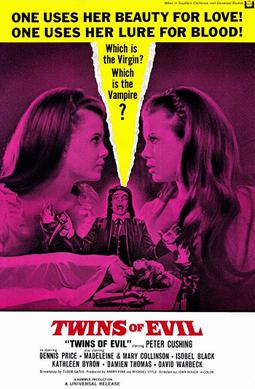
Twins of Evil is a 1971 British horror film directed by John Hough and starring Peter Cushing, with Damien Thomas and the real-life identical twins and former Playboy Playmates Mary and Madeleine Collinson.
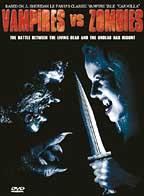
Vampires vs. Zombies is a 2004 American independent horror film loosely based upon J. Sheridan Le Fanu's classic 1872 novel Carmilla. Unlike Le Fanu's story, however, most of the action in the film takes place inside a car. The title and cover artwork were obviously inspired by the then-current horror film Freddy vs. Jason, but the movie itself bears less resemblance to this counterpart compared to other, more blatant Asylum mockbusters. The movie was originally titled Vampires vs. Zombies, but it has since then been changed to Carmilla, the Lesbian Vampire. Vince D'Amato is the director and screenwriter of this film.

Captain Kronos – Vampire Hunter is a 1974 British swashbuckling action horror film, written and directed by Brian Clemens, produced by Clemens and Albert Fennell for Hammer Film Productions, and starring Horst Janson, John Carson, Shane Briant, and Caroline Munro. The music score was composed by Laurie Johnson, supervised by Philip Martell. Shot in 1972, but belatedly released on 7 April 1974, the film was intended as the first in a series focused on the title character and his companions. Due to the film's violence and sexual subtext, Captain Kronos was rated R in North America. This was Clemens' only film as a director.
Vera Filatova, also known as Vera Graziadei, is a Ukrainian-British actress. She has played Elena in Channel 4's cult series Peep Show alongside David Mitchell and Robert Webb, Eva in Lesbian Vampire Killers with James Corden and Mathew Horne; and Svetlana in a five-part BBC1 drama The Deep opposite Minnie Driver, James Nesbitt and Goran Višnjić.

Carmilla is a Canadian single-frame web series co-created by Jordan Hall, Steph Ouaknine, and Jay Bennett. The series stars Elise Bauman and Natasha Negovanlis, and is loosely based on the novella of the same name by Sheridan Le Fanu. The series premiered on the Vervegirl YouTube channel on August 19, 2014. U by Kotex is the executive producer of the web series. The series takes place at the fictional Silas University in Styria, Austria, and is told through vlogs recorded by Laura, a first-year student. When Laura begins investigating the disappearance of her roommate, she is assigned a new roommate named Carmilla.

The Unwanted is a 2014 American thriller film written and directed by Bret Wood. It is based on the novel Carmilla by Sheridan Le Fanu but was transposed from a Gothic tale set in Austria to a Southern Gothic setting. It stars Christen Orr in the title role, a woman who comes to a small town in the Southern US to investigate the mother she never knew. Along the way, she meets Laura and her father Troy, locals who may know something about her mother. It premiered at the Atlanta Film Festival on March 31, 2014, and Kino International released it on DVD on July 14, 2015.















